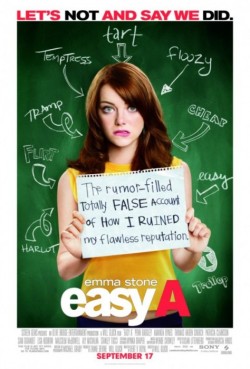Review: Easy A (2010)
 Note: This post contains a portion of a review originally written for CaryCitizen. To read the full review, click here.
Note: This post contains a portion of a review originally written for CaryCitizen. To read the full review, click here.
Female sexuality is one of those issues that most comedies stay far, far away from. That might mainly be because the majority of screenwriters and directors are men. Some of it could be due to audience demographics, the largest of which is men under the age of twenty-five. And who knows, maybe men just tend to find sex funnier than women. For whatever reason, Hollywood’s depiction of sex tends to follow a very male-oriented point of view, usually presenting it as a “rite of passage” quest in the vein of The 40 Year-Old Virgin or American Pie, in which women are ultimately reduced to objects to fulfill male desire. Easy A, directed by Will Gluck, is one of the few comedies in recent memory that attempts to tackle teenage sexuality from a female perspective. The result is an honest look at how sexuality is perceived, not just by high school students, but by men and women everywhere.
The plot follows Olive (Emma Stone), a teenager with a penchant for witty banter who claims to be a social outcast. How someone as attractive as Stone could ever be unpopular in a school filled with hormonal young men, I don’t understand, but that’s Hollywood casting for you. Incessantly asked about her non-existent sex life by her best friend Rhia (Alyson Michalka), she at last relents and claims to have lost her virginity to an older man. It’s a lie that’s overheard by conservative Christian classmate Marianne (Amanda Bynes), who promptly spreads the rumor around the school and resolves to save Olive’s presumably promiscuous soul. Her closeted gay friend Brandon (Dan Byrd) convinces her to claim to have had sex with him so that he can find acceptance amongst the jocks that bully him. One thing leads to another, and soon Olive is the biggest (and fakest) ho around, allowing men to claim they’ve slept with her in exchange for cash, and coming to school in with a big “A” stitched to her chest in the vein of The Scarlet Letter.
Stone has done well in previous supporting roles in films such as Superbad and Zombieland, but it’s here that she proves she can carry a film. Her performance is relaxed and effortless, navigating the various extremes of high school angst with ease. Even though Olive only achieves popularity through lying, we want her to be okay and escape the consequences, because unlike so many female protagonists she’s genuinely likable. Stone helps her to feel like a real person with good intentions, rather than just a superficial floozy or vain bimbo.